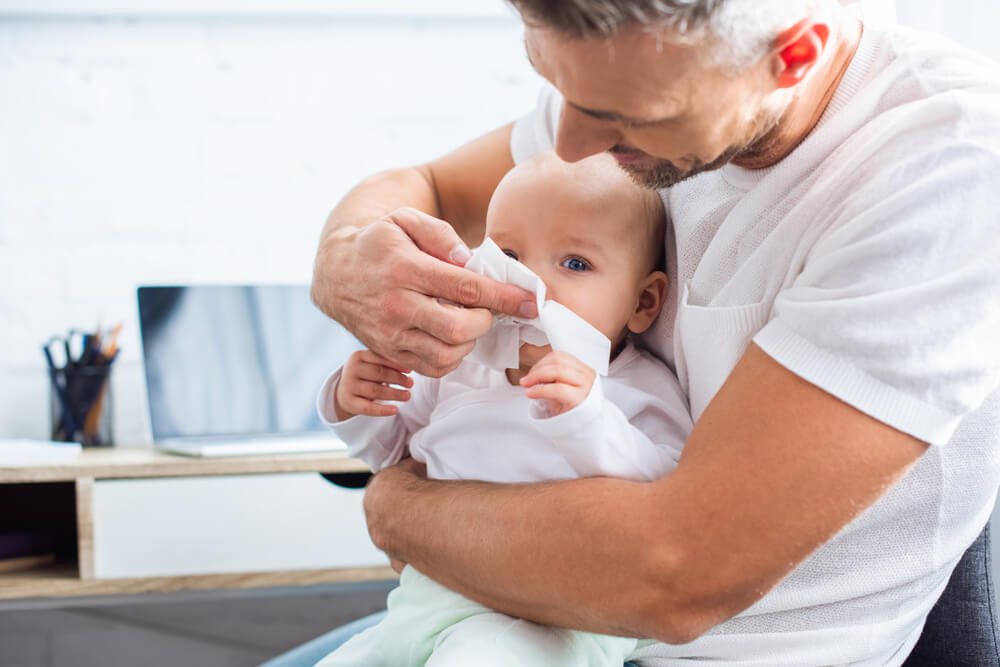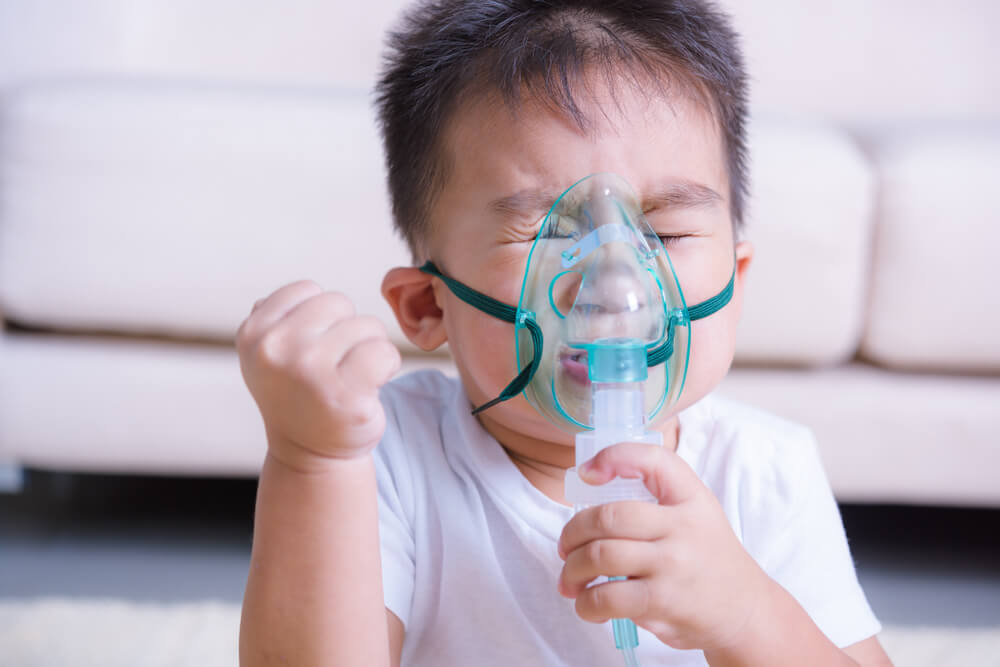Respiratory syncytial virus, or just RSV for short, is an illness that often causes breathing difficulties. People can get RSV regardless of their age, but the most vulnerable group includes very young children and babies. RSV symptoms in babies are usually linked to lung inflammations such as pneumonia and bronchiolitis. What’s more, it’s not uncommon to see RSV symptoms in babies at least once before they turn two. Also, it’s possible for babies to experience a recurrence of RSV. And the youngsters who have some other health issues with their immune system, heart, lungs or have been born prematurely are also at risk of developing more serious diseases.
Babies can contract RSV when they get into contact with the nose/mouth fluid from the infected person. What’s more, the virus can spread even when the babies touch their eyes, nose, or mouth after previously having touched a contaminated surface. When an infected person coughs or sneezes in the baby’s vicinity, the child can inhale these droplets and catch the virus that way, too. Typically, the baby will start showing symptoms of the infections anywhere between two and five days after being exposed to the virus.
What Are RSV Symptoms in Babies?

The first infection signs will present themselves through congestion and runny nose. However, worse symptoms are usually soon to follow, such as fever, breathing difficulties, coughing, and wheezing. The infection may lead to RSV vomiting in some babies on rare occasions. Unlike Covid and Norovirus, RSV doesn’t cause diarrhea.
With RSV, baby breathing can be affected so much that it leads to pneumonia and other more serious breathing diseases. If your child starts having severe breathing problems accompanied by chest rattling and they already belong to a high-risk group, make sure to take them to the doctor as soon as possible. You can always count on Dr. Romero-Bolumen, who has three decades of pediatrics experience. That said, the typical RSV symptoms in babies are as follows:
- Runny nose
- Coughing and wheezing
- Fever
- Issues with swallowing
- Chest straining and faster breathing
- Apnea
- Bluish fingertips and lips
How to Prevent RSV in Babies?
Suppose you wonder how to prevent RSV in babies. In that case, there are several tips that are generally recommended for minimizing the risk of contracting the virus, especially in the case of prematurely born kids:
- Breastfeeding the newborn
- Preventing any contact with smoke
- Staying away from childcare their first winter
- Keeping the kids away from people who are ill
Aside from the above-mentioned tips, hand washing and using hand cleaners with alcohol before touching the baby can also help. Make sure that you never let anyone smoke in your home or your car, and generally don’t take your baby to places where they can be exposed to cigarette smoke.
Does RSV Cause Diarrhea?
As mentioned, RSV doesn’t cause diarrhea and typically doesn’t show any gastrointestinal signs of infection. RSV vomiting may sometimes occur due to fever and congestion, but that’s not a common symptom either.
How to Prevent RSV in Babies Who Are High-Risk?
Together with the general prevention tips, high-risk babies are also recommended to take a palivizumab medicine. The medicine is administered via monthly injection during the peak RSV season, which is typically winter. However, seasons vary from place to place, which is why it’s important to discuss the ideal time for these injections with the pediatrician.
Home Treatment for RSV
As the name suggests, RSV is a virus. Therefore, it’s not guaranteed that giving your babies antibiotics will be of any help. However, there are several things that parents can do in order to make their ill child more comfortable.
In the case of congestion and coughing, humidifiers can come in handy as they moisten the air and make RSV baby breathing considerably easier. Make sure to replace the water every single day and clean the humidifier. Also, don’t put any kind of medicine inside the water.
When the baby is suffering from a stuffy nose, saline nose drops can do the trick and break the thick mucus. Then you can use a suction device to get all the mucus out.
There are certain med options to get the fever down in a baby with RSV. You can give infant Tylenol to babies older than two months or even Advil to babies older than six months. However, make sure not to give your child anything that contains aspirin or common cough and cold meds. Also, children that still haven’t turned one shouldn’t be given honey either.
Plenty of fluids can also help, especially if the fever triggers RSV vomiting. However, keep in mind that children who are still not one year old should not be given water or fruit juice. Bottle and breastfeeding in smaller amounts more frequently is the best practice. You can give water to kids who are older than one year and a chicken broth but still refrain from sugary juices.
In order to take the temperature most efficiently and safely, remember never to use a mercury thermometer and go with a digital one. Also, wash the thermometer every time you use it, especially if you’re checking the rectal temperature. In general, babies younger than three months should only have rectal temperature taken, while babies older than four can have their temperature checked rectally or via armpit and ear. Children who are four years old can get their temperature taken orally.
When to Take a Baby with RSV to the Hospital?

Unless RSV baby breathing is too ragged and difficult, it’s possible to treat your child at home, especially if the baby is older than six months. However, in the following instances, it’s prerogative to take your sick baby to see a doctor:
- The baby is younger than six months or belongs to a high-risk group and shows signs of RSV.
- The baby has trouble breathing and continually coughs for more than four days.
- The baby’s nose or mouth mucus is very thick and green, gray, or yellow.
- Complete lack of energy, without the will to eat, drink, or urinate.
- Three-month-old or younger babies have a higher fever than 100.4º F (38º C).
- Babies more than three months old have a fever higher than 102º F (38.9º C) and don’t drop even after two days.
If you’re ever worried about your baby suffering from RSV or any other virus or illness, don’t hesitate to seek professional help; even more so if you’re a first-time parent who hasn’t had any experience with infections in newborns. We are aware that it can be very challenging to make the right decision when choosing the best doctor for your little one. To ensure your child’s health and safety, feel free to reach out to us at Worldwide Pediatrics Group. We can promise that your child will be in the most trustworthy hands of a professional pediatrician in Miami. Your health is equally essential to provide for your child, so don’t let the stress consume you.



